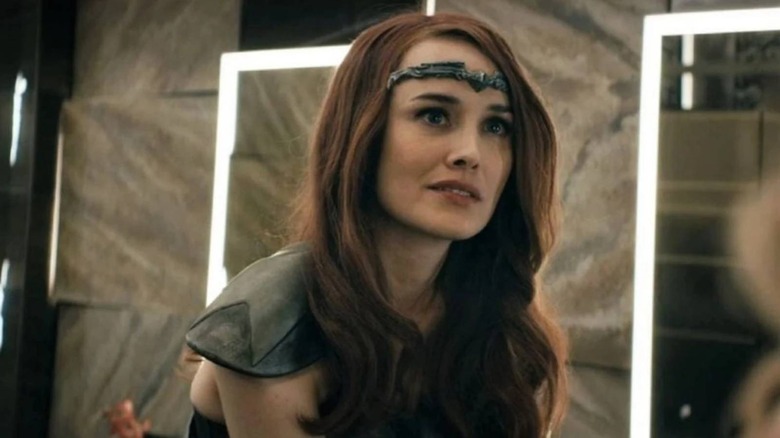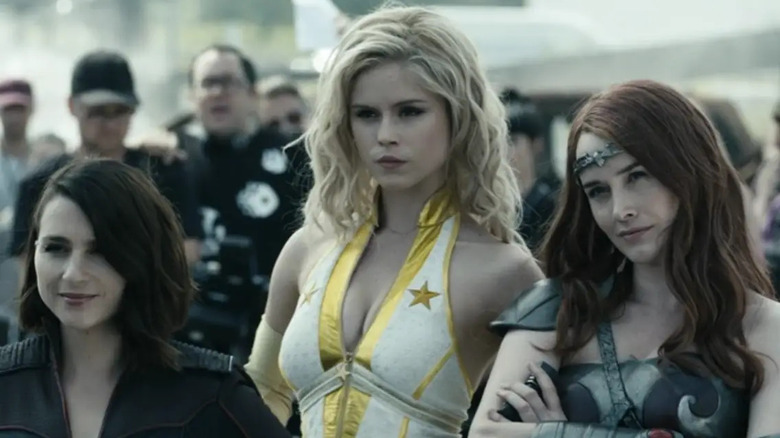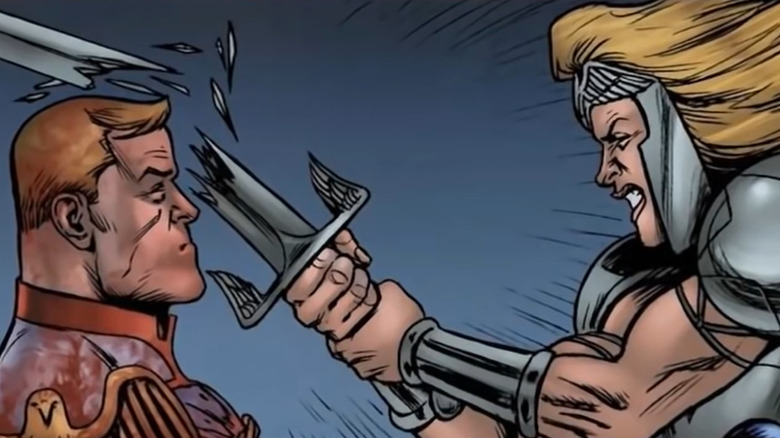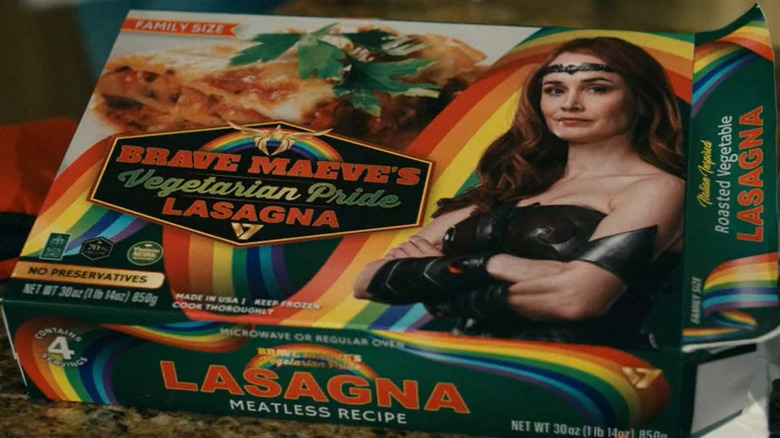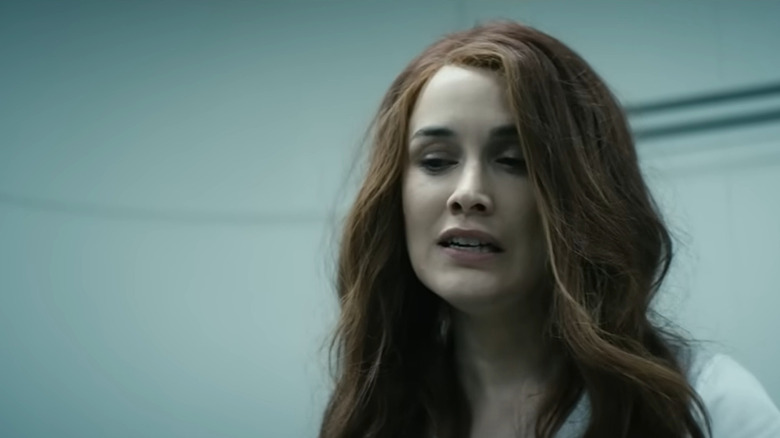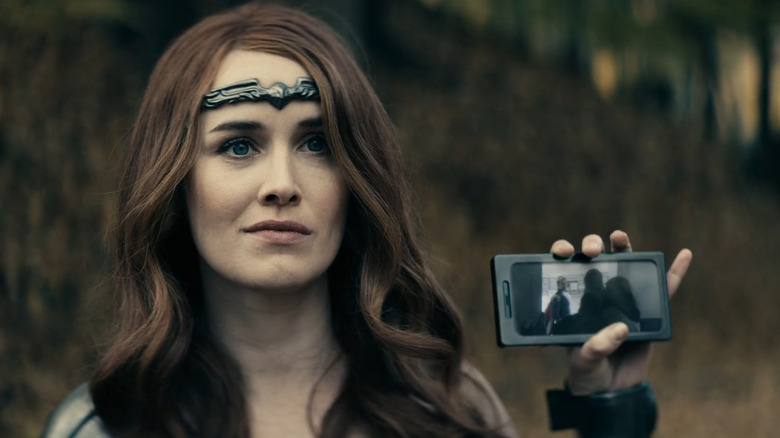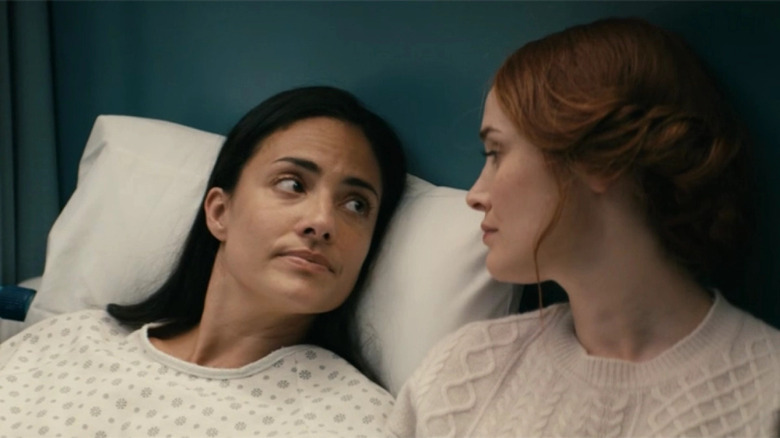Why The Boys Season 3 Chose That Direction For Queen Maeve
This post contains spoilers for the final episode of "The Boys" season 3.
Of all the characters in "The Boys," Queen Maeve (Dominique McElligott) is probably the most improved from her comic book counterpart. Comic book Maeve was a one-dimensional parody of Wonder Woman who had a minor turn towards the good side before being unceremoniously murdered by Homelander. The TV show, meanwhile, made it clear early on that their Maeve would be a lot more sympathetic and a lot more interesting. When she finally rebels against Homelander (Antony Starr) at the end of season 2, her plan actually works. Sure, Homelander calls her bluff later next season, but she still manages to save Butcher's (Karl Urban) life and escape that situation unscathed.
The biggest problem with TV Maeve so far is that she often feels like she doesn't get enough focus. Throughout season 3, Maeve has gone entire episodes without appearing. Even before she gets kidnapped by Homelander, there are still plenty of scenes and storylines involving the Seven where Maeve is just not there for whatever reason. This was particularly noticeable in "Barbary Coast," when Homelander tells Annie (Erin Moriarty) he no longer cares if the plane footage is released to the world. After this scene, you'd think Annie's first reaction would be to talk to Maeve about it, but if she does, we never get to see it. Before the season 3 finale gave us a ton of quality Maeve content, it felt like the show was forgetting about her.
Maeve's lack of screen-time
One potential explanation for Queen Maeve's lack of scenes this season is the actress Dominique McElligott being less available than her other co-stars. It's been rumored, though not confirmed, that Covid-related travel restrictions may have made it harder for the Irish actress to be on set (largely located in Toronto) for the same amount of time as her co-stars from other countries. If true, this certainly explains why the character's felt so absent. But it also makes it more impressive how successfully the show's taken advantage of her limited screen-time. Maeve may not show up often, but every scene she's been in has felt absolutely vital.
Perhaps the bigger reason for her lack of focus is that Maeve's character arc has mostly concluded with the season 2 finale. When she blackmails Homelander, she's finally shaken herself out of the apathetic worldview that seemed to define her in the beginning of the show. When she stands her ground against him, she's successfully overcome her fear and has learned to be a legitimate hero, especially since she's now using the blackmail not just to protect herself and her on-and-off-again girlfriend Elena; she's also protecting Butcher and the rest of the Boys, despite not even knowing them well.
The Maeve we get in season 3 is no longer going through any kind of major internal struggle. Season 3 Maeve knows what needs to be done and is willing to do whatever it takes to accomplish it. This lack of internal conflict may have led to less screen-time for the character, but it also led to one of the most Maeve-heavy episodes of the whole show: this week's "The Instant Hot-White Wild."
About that finale...
When it comes to Maeve, this week's episode almost seems to be apologizing for the previous seven. After spending the last two episodes locked up, Maeve finally breaks out, joins the Boys, then teams up with Soldier Boy (Jensen Ackles) and Butcher in an attempt to take down Homelander once and for all. Much like in the comics, Maeve doesn't win her fight with Homelander. But unlike the comics, Maeve still makes it out in one piece. Homelander might've destroyed one of her eyes, but she still gets some genuine hits in whereas comic Maeve gets immediately slaughtered.
However, things take a turn for the worse when Soldier Boy begins to let out another sonic blast that would probably destroy the whole building. Everyone else panics, but Maeve takes action and tackles Soldier Boy out the window. The explosion is huge, but no civilians appear to be harmed and all our other heroes make it out okay.
For a moment there, it seems like Maeve has been killed off. It would've been disappointing, but it also would've been an improvement on the source material. There, Maeve tries to strike Homelander with a sword but the sword snaps in half. Then Homelander easily rips Maeve's head off and throws it out the window. So instead of having Maeve decapitated and thrown off a building against her will, it seemed like the show had Maeve willingly make the jump in a heroic sacrifice. It would've been yet another example of how the show gives its female characters far more agency, even if it still follows the same basic plot beats.
The infamous 'bury your gays' trope
But "The Boys" didn't go down this route, and part of that's due to another change they made when adapting the character to the small screen: Maeve is now bisexual. Or, as Vought International would put it: Maeve is a lesbian.
When Homelander outed her in season 2, "The Boys" took this as an opportunity to critique both rainbow capitalism and bi erasure. Vought took full advantage of her sexuality to brand themselves as an inclusive company, all while changing her into a lesbian because that was deemed more popular with the American public than her being bi. It creates a very funny, well-observed gag throughout season 2 where corporate PR people refer to her as a "proud lesbian" and Maeve is simply too exhausted with life to even bother correcting them.
This storytelling choice also served as one of the biggest indicators that Maeve wouldn't be killed off like she was in the comics: not only is she already far more sympathetic than her comic counterpart, but now it would also be fulfilling the clichéd and regressive bury your gays trope. The trope became particularly infamous back in 2016 when a string of popular shows each killed off a prominent queer character (usually a woman) within a weirdly short time span. Queer characters will often die to teach the audience that homophobia is wrong, or they'll die because the show wanted to raise the stakes and the queer character was deemed most expendable. Or as what was almost the case in this episode, the queer character will nobly sacrifice themself for the benefit of the other (largely straight) characters.
Avoiding the trope
Although a show isn't inherently homophobic if they kill off a queer character, it's easy to see how the popularity of this trope reinforces a lot of negative ideas. It can also feel absolutely draining for queer viewers, many of whom have learned to expect little in terms of representation in mainstream media and are still constantly left disappointed. With that in mind, Maeve dying heroically by sacrificing herself for the sake of a bunch of straight main characters might've worked for a lot of the audience, but it would've been a somewhat cheap fulfilment of this trope, made even worse by the fact that Maeve was barely in the season prior to this episode.
A few minutes pass after the explosion before it becomes clear that Maeve hasn't actually died. The first sign is when the news reporter on the TV reports on her death, obliviously praising her as a "proud lesbian" one last time. The tone of the news report leans into the narrative of the noble minority sacrificing themself for the greater good, in a way that's far too blatant to not be "The Boys" making another satirical point.
Sure enough, Maeve shows up once again. She's lost an eye and she's bruised up pretty badly, but she's alive. Not only that, but because everyone believes she's dead and she's no longer a supe, she's now able to live the rest of her life in peace with her girlfriend Elena. For perhaps the first time in "The Boys'" three seasons, Maeve seems happy. Not only did "The Boys" not bury its most prominent queer character, but they had her be the only one in the show with a conclusive, uplifting ending.
A display of the show's optimism
From its first episode, "The Boys" has been criticized for being aggressively cynical and obsessed with shock value, but I've never really considered that to be the case. Yes, this universe is incredibly heartless and there are tragedies all around, but that only makes the characters' occasional triumphs that much more exciting and impressive. (And honestly, the fact that Homelander still hasn't snapped and destroyed half of mankind seems absurdly optimistic by this point.)
Then again, maybe the show just seems hopeful because its source material is aggressively cynical. Every step of the way, the show has imbued more humanity into its main characters, making most of them far more sympathetic than their comic counterparts. You can see the show's optimism on display not just when Maeve's revealed to be alive and safe, but when we cut to Ashley (Colby Minifie) back at Vought. Ashley finds footage that reveals Maeve's still alive, and without saying anything she deletes it, then gives her assistant a look that clearly says "never mention this again."
The show didn't have to include this scene — viewers wouldn't have complained if the show simply established that the Boys managed to avoid any cameras when rescuing Maeve — but they included it anyway because they wanted to show that Ashley does in fact have a heart, that she does care about Maeve and wants her to be okay. A truly cynical show would never have given Maeve a happy ending, and they never would've given Ashley this little moment.
Letting Maeve go
Unfortunately for fans of Maeve, this happy endings of hers will only really stick if she stays out of the show. If we see news of Dominique McElligott returning to her role in season 4, the implication will be that her quiet, peaceful life with Elena will be disrupted in some major way.
Her apparent departure from the series is reminiscent of the discussion around Neve Campbell possibly not returning to her role as Sidney Prescott in the new "Scream" films. (And even when she did appear in the latest one, it was a relatively minor role removed from the action.) Most "Scream" fans would love for Sidney to be the main character again, but they also want Sidney to be happy, and those two wishes contradict each other. The last two films established that Sidney's finally made a stable, peaceful life for herself; do we really want to watch another ghostface killer take that away from her yet again? If we don't want to risk tarnishing her wonderful character arc in the original "Scream" trilogy, it might be best for the franchise to keep moving further on from the character.
Likewise, the best thing for Maeve's well-being is for the show to move on from her. For the many fans who connected hard with the character, it's disappointing to think she might not return for season 4, but as long as she's off-screen we'll be able to safely assume she's happy. She's finally gotten what she's wanted for the past three seasons; if the show's going to take that away from her in season 4, they better have a very good reason.
